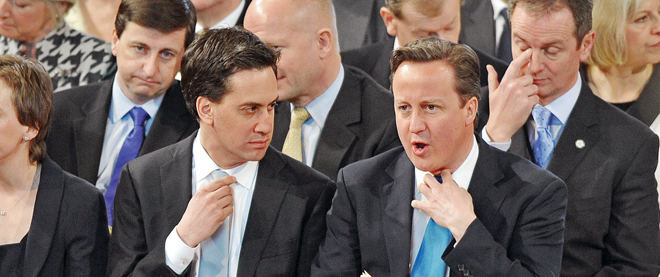Will too much compromise split Britain’s coalition government?
Two years in, relations between Britain’s coalition partners Cameron and Clegg hit an all-time low
John Stillwell/Getty Images
Share

They seemed so smitten with each other, standing side by side in the 10 Downing Street rose garden, so full of innocence and hope. David Cameron and Nick Clegg, leaders of Britain’s Conservatives and Liberal Democrats respectively, were forming a coalition government and were appearing together to announce it to the press. If there was any lingering bad blood—David Cameron was reminded of the time he had said his favourite joke was Nick Clegg—they laughed it off. They were united, said Cameron, by a desire to provide Britain with stable leadership. Added Clegg: “This is a government that will last.”
That was a little more than two years ago. The stability of their coalition today, however, looks far from certain. A chance for power can motivate opposing parties to put their differences aside. Watching that power slip away has a more divisive effect. Opinion polls since May show the opposition Labour Party with a consistent 10-point lead over the Conservatives. Support for the Liberal Democrats fell off a cliff shortly after the last election and has stayed there pretty much ever since.
Members of both parties worry that the coalition involves too much compromise. Left-leaning Liberal Democrats feel their party has sold out, notably by raising university tuition fees, despite an election promise to scrap them altogether. “There is a real sense of betrayal,” says Judi Atkins, a research fellow at the University of Leeds. Some Tories similarly believe Cameron panders too much to his Liberal Democrat partners.
Cameron and Clegg are actually more ideologically suited to working together than many of their respective MPs. Clegg comes from the Lib Dems’ “Orange Book” wing, which stresses personal and economic liberalism, not social democracy, while Cameron had softened the Conservative Party’s hard-right edges in an effort to broaden its appeal. But the two parties still form an unlikely, and perhaps unworkable, union.
“These differences and difficulties are manageable when things are going well, but once it looks as if parties may lose support at the next general election, they go from chronic to acute,” says Tim Bale, a politics professor at the University of Sussex. “Things are falling apart now, and the only thing holding them together—apart from a shared commitment to tackling the deficit, in the hope of the electoral reward it might bring—is the knowledge that splitting might trigger an early election and possible meltdown. Bad enough for the Tories, but they would survive. Catastrophic for the Lib Dems.”
The coalition government deserves much of the blame for its slide. The British economy is still weak. “For a year or two any government can blame its predecessor for pretty much everything that goes wrong,” says Bale. “There comes a time, however, when that excuse runs out. That time is now.”
But Labour Leader Ed Miliband, whose victory over his more right-wing brother David surprised many Labourites when he won the party leadership in 2010, has also grown into his role—even if U.S. Republican Party presumptive nominee Mitt Romney apparently couldn’t remember his name when they met this summer.
Miliband’s call for “responsible capitalism” seemed esoteric when he made it at the Labour Party conference last fall, says Guy Lodge, associate director at the Institute for Public Policy Research. But amid British banking scandals and the ongoing global financial crisis, it is beginning to resonate.
Miliband’s success is still far from assured. A mid-term surge for the opposition candidate is common, and much can change between now and the next general election. Lodge also cautions that Miliband still lacks a certain prime ministerial gravitas when compared to Cameron. The Labour leader is 43 years old—barely younger than the prime minister—but he can appear boyish and awkward. On election day, voters need to be able to close their eyes and imagine Miliband standing in front of 10 Downing Street as prime minister. But, says Lodge, Britons are gradually warming to this idea. “There has been a shift in the sense that the Labour Party looked like they weren’t real contenders for power until about six months ago. That’s changed.”
Meanwhile, despite the misgivings of chunks of both their respective parties, Cameron and Clegg seem determined to make a go of their alliance for the time being. While leading an ungainly coalition is no doubt frustrating and may be damaging to their long-term electoral prospects, it beats being in opposition.
Cameron has promised to release a new slimmed-down coalition agreement this summer that will set out the government’s goals for the rest of its mandate. There’s no word as to where he and Clegg will present the plan, but it probably won’t be in a rose garden.